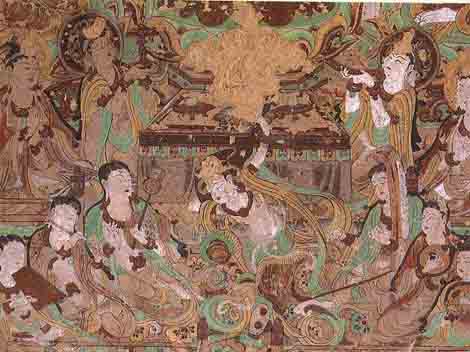more>>More News
- National Day
- ways to integrate into Chinese style life
- Should they be in the same university with me?!!
- Chinese Ping Pang Legend: the Sun Will Never Set
- A Glance of those Funny University Associations
- mahjong----The game of a brand new sexy
- Magpie Festival
- Park Shares Zongzi for Dragon Boat Festival
- Yue Fei —— Great Hero
- Mei Lanfang——Master of Peking Opera
Dunhuang Fresco
By admin on 2015-01-16
Dunhuang fresco is the composing part of Dunhuang
grotto art. The grotto art of Dunhuang is great and profound. Represented by
Mogao Grottoes, the grotto art of Dunhuang is rich and colorful, and exist in
large quantities, including frescos, painted sculptures, scriptures, scrolls and
a lot of other artistic forms. Among the artistic forms, the relics of the
frescos in the Mogao Grottoes are the most attractive. In the Tang Dynasty, the
Mogao Grottoes had boasted more than a thousand stone grottoes. Now, 492
grottoes have been left, together with 45000 square meters of frescos in
them. The portrayed social life scenes and appearances of
various people of different dynasties before the Tang Dynasty among the frescos
of Dunhuang are the precious materials for researching on the clothes and
customs of the people of all the ethnics in different dynasties. The frescos can
be divided into Buddha statue paintings, Buddhist sutra paintings, narrative
paintings, alimentation paintings, animal paintings, landscape paintings,
decoration paintings and so on. The Buddha statue paintings include the
portraits of various Buddha statues and Bodhisattvas while Buddhist sutra
paintings, which are also called "sutra converted painting", uses the means of
painting to express the contents of Buddhist sutras. The narrative paintings,
however, are characterized by rich contents, vivid plots and strong traces of
life, so, they are embedded with great attractiveness. Alimentation paintings
are the portraits of the people who believed in Buddhism and donated funds to
build grottoes, together with their relatives and servants. The beautiful
natural sceneries in some of the landscape paintings are painted according to
the landscapes in sutra, while some others are independent pictures that take
landscapes as the main parts. There are also colorful decoration paintings,
which were used to decorate the grotto buildings. Dunhuang frescos have abundant contents, varied forms
and vivid time characteristics. They reflect that the craftsmen at that time had
advanced painting skills and abundant imagination power. They provide a large
amount of objective materials for researching on the Chinese art
history.
- Contact Us
-
Tel:
0086-571-88165708
0086-571-88165512E-mail:
admission@cuecc.com
- About Us
- Who We Are What we do Why CUECC How to Apply
- Address
- Study in China TESOL in China
Hangzhou Jiaoyu Science and Technology Co.LTD.
Copyright 2003-2024, All rights reserved




 Chinese
Chinese
 English
English
 Korean
Korean
 Japanese
Japanese
 French
French
 Russian
Russian
 Vietnamese
Vietnamese
